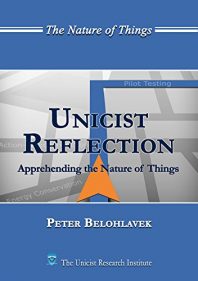Unicist reflection is an approach to complex human adaptive systems to understand their nature, define the possibilities to influence them, apprehend the algorithms that allow exerting influence and generate added value.
Unicist reflection has no relationship with other introspective approaches like religious introspection, transcendent meditation, yoga or other technologies that have been developed for different purposes. Unicist Reflection has been developed to deal with complex human adaptive systems, such as businesses, to develop scenarios, diagnoses and strategies to achieve possible results.
Reflection covers five stages before reaching the environment adaptation and the influence upon it.
Business Problem Solving
0 – Focus on the solution
1 – Dealing with projections
– Beta brainwaves suffice
– Destructive pilot tests
2 – Dealing with Introjections
– Alpha brainwaves are needed
– Non-destructive – Destructive pilot tests
Universal Problem Solving
3 – Dealing with integration
-Theta brainwaves are needed
– Non-destructive pilot tests
4 – Dealing with communion
– Gamma brainwaves are needed
– Results validation
5 – Dealing with the unified field
Stages 1), 2) and 3) include pilot tests. Stages 4) and 5) imply real action.
Introduction
Reflection may only occur when there is a need to influence in an adapted way. There are three necessary conditions:
1) For this to occur there must be a serious condition of “hunger” to change something either in oneself or in the environment, without implying an aggression to the environment or to oneself.
2) On the other hand, there must be an absolute sense of responsibility as regards feeling both able to do it and responsible for it.
3) There must be a strong will which enables the individual to dodge the obstacles placed by the environment and his own prejudices.
Reflection is a natural way when one feels the need to influence a reality and aims at doing it in an adapted way.
The structure of the reflection process
Reflection is the process to approach complex realities in their nature, finding their functional oneness.
The unicist approach defines that every functional reality evolves based on a unique concept that rules its evolution.
That is the reason of the name unicist: one functional reality = one concept.
To approach the nature of a reality it is necessary to enter into it based on one’s nature.
- Facts are understood comparing with facts.
- Reasons are understood thinking.
- Emotions are apprehended with one’s emotions
- Nature needs to be apprehended with one’s nature
 This explains why the nature of reality can only be perceived living that reality. Living a reality implies being able to introject it, being part of it and not an observer.
This explains why the nature of reality can only be perceived living that reality. Living a reality implies being able to introject it, being part of it and not an observer.
This is a significant effort because concepts, which describe reality’s nature, are not human-built ideas. They are discovered preexisting functions of a specific environment.
Simple problems can be approached using a factual, reasonable and psychological approach. Complex problems require the apprehension of their nature. Apprehension of nature requires the discovery or rediscovery of their concepts.
Apprehending the nature of a reality means exerting influence on the environment, which is limited by the inertia of such environment, in order to be able to achieve the results of the unicist reflection process.
The structure of the reflection process can be described as:
Intuitive Projection
The “reflecting outside” stage deals with the projection of our own preconceptions and implies comparing them with the reality facts or with other people’s preconceptions.
 This is a natural human behavior. When one is giving an ungrounded opinion, one is making an intuitive projection of reality. Common sense is a demonstration of the intuitive projection.
This is a natural human behavior. When one is giving an ungrounded opinion, one is making an intuitive projection of reality. Common sense is a demonstration of the intuitive projection.
Rational Projection
The intuitive projection needs to be justified. This justification is what we call the rational projection. Justifications differ structurally from foundations.
While foundations are reasonable, comprehensible and provable arguments, justifications are demonstrations that one is right.
Rational projections are a necessary step to apprehend the nature of a reality. The accepted myths of cultures are expressions of rational projections.
Introjecting Reality
Reality is introjected to be able to influence the environment. The objective is to develop a strategy which allows influencing while being influenced.
It implies a great empathy effort since it is necessary to develop the capacity to act in the environment having introjected such reality and being able to influence it.
Focusing on Reality
Focusing on reality implies the integration on two focuses. On the one hand, the focus on the environment, which means trying to integrate with it and accept its influence.
On the other hand, focusing on the influence one is trying to exert on the environment. This level of reflection requires a fully adapted behavior. One must be in peace with the environment one intends to influence.
Universalizing Reality
The essence of a reality has been apprehended when its universality has been discovered. It is the highest level of apprehension of nature.
When this level is achieved, the influence on the environment is harmonic.
Peter Belohlavek
The Unicist Research Institute


